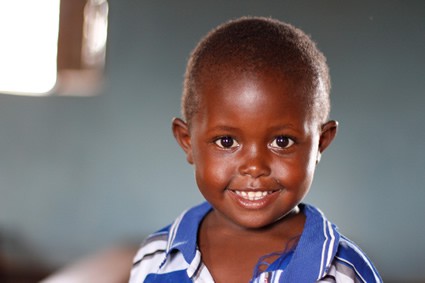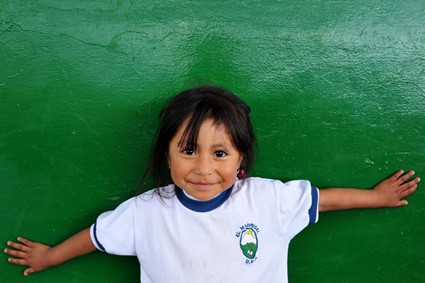![]() Making the decision to support a child living in poverty is a commitment — financially and relationally.
Making the decision to support a child living in poverty is a commitment — financially and relationally.

A big component to committing to child sponsorship is knowing the organization that you are partnering with. You should feel comfortable with where you send your money, and we believe there are six questions you should ask before deciding which organization is right for you.
1. Who implements the program?
For us, the answer is the church. We have over 5,700 Implementing Church Partners (ICPs) and they work diligently to tailor our holistic child development model to the local, contextualized needs of each area.
Our church partners know the children on an individual basis; they know each child’s individual needs, and they implement the program in the name of Jesus.
2. Who most directly benefits from the program and from my donation?
The beneficiary of our child sponsorship program is the individual child. As an organization, we don’t target community development or work toward regional poverty reduction.
Rather, we work with each child on a unique and individual level so that his or her specific needs are addressed.
The families of Compassion-assisted children receive additional or indirect benefits from their child’s sponsorship, but our focus is the one child. The result of this strategy is that by changing the life for one child, we work toward a critical mass that can transform an entire community or even a nation.

3. How often does the child participate in the program?
The standards we have defined are:
- At a minimum, every child development center operates 4-8 hours of programming each week, at least 48 weeks out of the year.
- Individual child attendance is taken each time the center is open.
Many of our development centers structure the frequency based on local, contextual needs, but all of them meet this standard.
4. What program does the child experience?
Our programs are summed up in the phrase, “long-term, Christian holistic child development.” We want them to do more than combat economic poverty. We want to release children from spiritual, social and physical poverty, too.
That’s holistic development: addressing every major aspect of the child’s being, every element that they need to survive, develop and thrive.
5. What if the child has unique needs?
Because our church partners work one-on-one with children, they are more aware of the children’s unique and individual needs.
Church workers are poised to note significant changes in child well-being, behavior, or family situation and address these issues through Complementary Interventions (CIV). Through CIV funding we work to prevent and respond to the distinct needs of each child.

6. What is the role of the sponsor?
At Compassion, our one-to-one sponsorship model isn’t a funding mechanism for other programs; it’s a facilitated relationship that changes lives.
Our sponsorship program is an opportunity for individual sponsors to minister to individual children in the developing world. That’s why we emphasize correspondence and sponsor engagement — we know that the grace-filled words of a sponsor can accomplish just as much in the life of a child as a few dollars every month.
Partnering with the local church in a one-to-one relationship is a child sponsorship model we have seen work well for more than 60 years. Would you consider becoming part of our family and support a child living in poverty by becoming a sponsor?







14 Comments |Add a comment
Hi,
I feel very sad to read this blog..On this blog about the boy who is on a bad of hospital..I want to sponsored this boy..I want to do help him..So I appreciated that blog..thanks for sharing all this great information about this boy..
I have been sponsoring a boy from Kenya about 6 years now. He is going to be 18 in November. I was wondering how long my sponsorship is supposed to last. We have sent letters all these years and I have enjoyed being his sponsor, but with my finances I need to let this go. I thought since he would be turning 18 it would be an appropriate time. Any advice?
Hi Jennifer! Some sponsorships end at 18 but others don’t end for a few more years. Give us a call (800-336-7676) and we can tell you when your sponsored child will be departing the program.
Good morning,I’ve been listening to Kim Davidtz Compassion International on our local radio station……..like always enjoying it and really getting a inspiring message with lots of laughter! Would like to make one suggestion to Kim:please refer and repeat the Bible verse your thought is about more clearly. Afterwards i sometimes just remember your “joke ” and not the Word which is suppose to stay with us……….Thank you and stay blessed!!!
Good Morning Elizabeth. Thanks for the feedback, we appreciate you taking the time to tell us. Blessings back to you to! Jacquie
Hi, I have been sponsoring a child for many years. She is now 15. Suffice to say, I have been very steadfast in my financial giving to this lovely child (now 15). However, I don’t feel I’ve been a very good mentor, since my own faith has been, and continues to be sorely lacking. Her own letters are written with such lovely thoughts and prayers. I feel a bit phony. I have never disclosed any of this in my letters – she is after all still a child. I want her to stay steadfast in her own faith, and do not want to burden her with my issues. Still…
Hi Jacquie,
Just to be clear. Are you claiming that Compassion was involved in ending the Korea war, and bringing it to the economic powerhouse that it is today? How many children were sponsored in Korea? Why has this amazing social change happened elsewhere that Compassion works?
It seems a little far fetched to use Korea as the example of a successful policy when so much of what has happened in that country is dependant on issues that occur on a military and government scale.
Thanks for asking for clarification Cornelius and no, I am not claiming that.
Hi Jacquie,
It’s mainly because of the inequality it creates within a community and the development of an imbalance between those selected for the program and those not. It’s a feel good, simplistic response that doesn’t take into account the needs of a community, leading to very little lasting change and tension within groups. The overemphasis on Christian values also develops a power structure where those controlling the aid are preaching certain values. I’m a Christian but I believe that we should show God’s love through what we do and say.
There is a host of development research and reports from the last 20 years to support this.
Hi Cornelius,
I’m glad you responded to my question and I do understand where you are coming from, as our field staff has shared about the hurt families feel when their children are not accepted into our program. As you can imagine, I will have to respectfully disagree that one to one sponsorship is a feel good, simplistic response to poverty. Investing in the life of an individual child takes time and is not simple. To get to know someone, you need to know about them, you need to know about their family and you have to understand the community they live in.
If you have a few minutes, this video does a great job in explaining why we do what we do: https://blog.compassion.com/child-development-or-community-development.
Cornelius, no child sponsorship program, no aid program is perfect, including us. And as hard as we all try, that is just the reality. But to say there is little lasting change with one to one sponsorships is untrue. You only have to look to Korea to see that. 60 years ago Compassion started in Korea. Today, children in Korea no longer need sponsors and Koreans are now sponsoring children all over the world. That is lasting change through individuals on a national level.
Again, I am grateful you responded to my question and sincerely appreciate your honesty!!
Jacquie
Having grown up in a 3rd world country, I can tell you that this:
“2. Who most directly benefits from the program and from my donation?
The beneficiary of our child sponsorship program is the individual child. As an organization, we don’t target community development or work toward regional poverty reduction.”
is the most horrific and stupid aid policy I have ever come across.
Why do you say that Cornielius?
Wonderful post! My comment as I Shared it on Facebook suggests that anyone who considers sponsoring a child should know the answers to the same questions, regardless of which organization they consider working through.
Good job, y’all.
Those are great questions, and great responses!! I’m sure many people would be surprised to get the answers to these questions from other organizations. Of course, the greatest differentiator of Compassion for me is the “in Jesus name” statement! All I can say is “God Bless!!!”